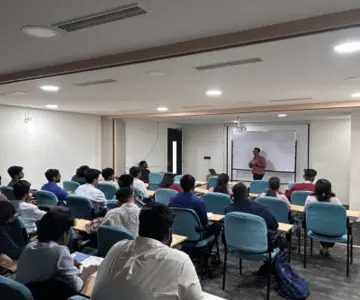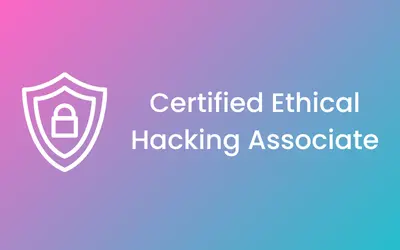- Ethical Hacking Focus: The training is fully centered on ethical hacking concepts, helping learners understand attacker techniques, legal boundaries, and defensive strategies required to identify and fix system vulnerabilities effectively.
-
Industry-Aligned Curriculum: The course syllabus is designed around real ethical hacking workflows, covering penetration testing, vulnerability assessment, and exploitation techniques that align closely with current industry hiring expectations.
-
Expert Mentors: Learners are guided by trainers with hands-on ethical hacking experience, enabling a better understanding of real attack scenarios, tool usage, and problem-solving approaches used in professional security testing.
-
Hands-On Labs: Practical labs and simulations allow students to perform controlled attacks, test system weaknesses, and apply ethical hacking techniques, building confidence and technical accuracy through continuous practice.
-
Recognized Certification: Completing the course earns a recognized certification that validates ethical hacking skills and improves credibility when applying for roles, internships, or freelance security testing opportunities.
-
Flexible Learning: Multiple batch options, including weekday and weekend schedules, help students and working professionals learn ethical hacking without disrupting their academic, job, or personal commitments.
-
Placement Support: Dedicated placement assistance helps learners prepare resumes, crack interviews, and connect with companies seeking ethical hackers, penetration testers, and vulnerability assessment professionals.
-
Modern Tools: Students gain exposure to widely used ethical hacking tools for scanning, exploitation, and reporting, ensuring they are comfortable working with technologies used in real-world security testing.
-
Practical Scenarios: Training includes real-life attack case studies and simulated environments that help learners understand how ethical hacking is applied across networks, applications, and enterprise systems.
-
Learning Community: A supportive peer environment encourages discussion, collaboration, and knowledge sharing, helping learners grow faster and stay motivated throughout their ethical hacking learning journey.
Why Pune Is a Growing Hub for Ethical Hacking Careers
Pune has grown into a major technology and innovation center, making it a strong destination for ethical hacking careers. The city hosts a large concentration of IT companies, software development firms, SaaS startups, and global delivery centers that manage complex digital systems and sensitive data. As organizations increasingly rely on cloud platforms, web applications, and remote infrastructures, the risk of cyber threats has also increased. This has led to a consistent demand for ethical hackers who can test systems, identify vulnerabilities, and strengthen security before real attacks occur.
Another key reason Pune supports ethical hacking careers is its strong academic and skill-development ecosystem. Known as an educational hub, Pune attracts students from across the country to its engineering colleges and technical institutions. This talent pool creates an environment where ethical hacking skills are actively learned, practiced, and refined. Frequent tech meetups, cybersecurity workshops, capture-the-flag events, and industry-led sessions help learners stay updated with real-world hacking techniques, tools, and attack methodologies used by professionals.
Pune also provides better entry-level and growth opportunities for aspiring ethical hackers compared to more saturated metro cities. Many organizations in Pune hire freshers for internships, junior penetration testing roles, and security testing positions, allowing early exposure to live projects and enterprise environments. With a balanced cost of living, a growing job market, and continuous demand for skilled security professionals, Pune offers a sustainable career path for ethical hackers looking for long-term growth and hands-on industry experience.
Scope of Ethical Hacking Careers in Pune
Pune has emerged as a promising city for ethical hacking careers due to its expanding IT industry and increasing reliance on secure digital systems. With organizations adopting advanced technologies, cloud platforms, and online services, the need for professionals who can proactively test and secure systems has grown significantly. Ethical hacking plays a critical role in helping companies identify weaknesses before attackers exploit them, making this skill set highly valuable across industries in Pune.
-
High Industry Demand: Pune-based IT firms, startups, and service companies actively seek ethical hackers to assess security risks, perform penetration testing, and protect business-critical applications and infrastructure.
-
Entry-Level Opportunities: Freshers can access internships and junior security testing roles in Pune, allowing them to gain hands-on experience and build practical skills early in their ethical hacking careers.
-
Diverse Job Roles: Ethical hacking professionals in Pune work in roles such as Penetration Tester, Vulnerability Analyst, Web Application Tester, and Security Assessment Specialist across various domains.
-
Startup and Enterprise Exposure: The city’s combination of startups and established organizations gives ethical hackers exposure to a wide range of security challenges, from small applications to complex enterprise environments.
-
Growing Cloud Adoption: As Pune companies increasingly use cloud infrastructure, ethical hackers with skills in cloud security testing and configuration assessment are in higher demand.
-
Career Growth Path: Ethical hacking offers structured career progression in Pune, enabling professionals to move into advanced penetration testing, security consulting, or leadership roles with experience.
-
Competitive Salary Potential: With the rising importance of cybersecurity, ethical hackers in Pune can expect steady salary growth as their expertise, certifications, and project experience increase.
-
Learning and Networking Ecosystem: Pune’s strong education and tech community ecosystem supports continuous learning through workshops, training programs, and cybersecurity events.
Overall, the scope of ethical hacking careers in Pune continues to expand as organizations prioritize security and proactive threat prevention. For students and professionals willing to build strong practical skills, Pune offers a balanced environment of learning, job opportunities, and long-term career growth in ethical hacking.
Why Students Choose Skillfloor for Ethical Hacking
Students increasingly choose Skillfloor for ethical hacking because the institute focuses on practical, industry-relevant training rather than just theoretical knowledge. Ethical hacking is a skill that requires hands-on experience to identify vulnerabilities, simulate attacks, and implement security solutions effectively. Skillfloor’s course offers a well-structured learning path where students start with foundational concepts such as networking basics, system security, and ethical hacking principles, then progress to advanced topics like penetration testing, web application security, wireless attacks, and cloud security. Each module combines theoretical understanding with real-world simulations, giving learners the confidence to apply their skills in professional environments.
Another reason students prefer Skillfloor is its expert guidance and personalized support. Experienced instructors with real-world ethical hacking and penetration testing experience lead the training. They not only explain complex topics clearly but also mentor students through hands-on labs, live hacking simulations, and practical exercises. Small batch sizes and interactive sessions ensure that learners receive individualized attention, helping them overcome doubts and develop a deeper understanding of security tools and techniques. Even students with minimal technical backgrounds can follow the course smoothly and gradually build expertise in ethical hacking.
In addition to training, Skillfloor emphasizes career readiness and placement support, making it a preferred choice among students. The institute guides resume building, interview preparation, and practical advice for securing internships or full-time positions in ethical hacking and cybersecurity domains. With the rising demand for ethical hackers in Pune and across India, Skillfloor’s placement assistance helps students connect with companies looking for skilled professionals. Flexible learning options, affordable fees, and exposure to industry-standard tools further strengthen the value of the course. By combining practical skills, mentorship, and career support, Skillfloor ensures that students are not just trained but are fully prepared to launch successful and sustainable careers in ethical hacking.
Ethical Hacking Placement Support at Skillfloor
Skillfloor provides dedicated placement support to help students transition from training to professional roles in ethical hacking. The placement assistance is designed to make learners job-ready and increase their chances of securing high-quality opportunities. Key points include:
-
Resume Building Assistance - Students receive guidance to create professional resumes highlighting ethical hacking skills, certifications, projects, and hands-on experience to impress recruiters.
-
Interview Preparation - Skillfloor conducts mock interviews, technical assessments, and soft skill sessions to help students confidently face real-world job interviews in ethical hacking and cybersecurity.
-
Industry Connections - The institute maintains strong relationships with IT companies, startups, and service providers, connecting students with employers actively hiring ethical hackers and penetration testers.
-
Internship Opportunities - Students gain access to internships that provide practical exposure, helping them apply classroom knowledge to live systems and real-world security challenges.
-
Job Placement Guidance - Skillfloor offers personalized guidance on job search strategies, application processes, and professional networking to maximize employment opportunities.
-
Exposure to Live Projects - Through live project experience, students gain a practical understanding of ethical hacking workflows, vulnerability assessment, and penetration testing, increasing their employability.
-
Career Mentorship - Experienced mentors provide advice on career growth, role selection, and skill development to ensure students make informed career decisions in ethical hacking.
-
Support for Freelancing and Consulting Roles - Skillfloor also guides students seeking freelance or consulting opportunities in ethical hacking, broadening career options beyond traditional employment.
This structured placement support ensures that students completing Skillfloor’s ethical hacking training are not only skilled but also well-prepared to secure meaningful roles and start successful careers in cybersecurity and ethical hacking.
Ethical Hacking Course Fees at Skillfloor
Understanding the Ethical Hacking course fees in Pune at Skillfloor is priced at ₹14,900 affordable and value-driven course, covering core areas such as penetration testing, network security, vulnerability assessment, web application security, and cloud security. The fee includes hands-on labs, real-world projects, and practical exercises to help learners gain industry-ready skills. This fee also covers expert guidance from industry-experienced trainers, mentorship, and preparation for recognized ethical hacking certifications. The course is designed to provide both theoretical knowledge and practical exposure, ensuring that students can confidently handle real-world security challenges. Flexible payment options and installment plans are available, making the course accessible to students and working professionals alike. Investing ₹14,900 in Skillfloor’s ethical hacking training offers more than just learning—it prepares students for long-term career growth in roles such as Ethical Hacker, Penetration Tester, Security Analyst, and Vulnerability Assessment Specialist. With growing demand for cybersecurity professionals in Pune and across India, the course fee represents a balance of affordability, practical learning, and career opportunities.
Ethical Hacker Salary & Career Growth in Pune
Ethical hacking is one of the fastest-growing career paths in Pune due to the increasing demand for cybersecurity professionals. Organizations across IT, fintech, e-commerce, and startups require skilled ethical hackers to protect systems, data, and networks. Professionals trained in penetration testing, vulnerability assessment, and network security are rewarded with competitive salaries and rapid career growth. Below are key points highlighting salary trends and career progression for ethical hackers in Pune:
-
Entry-Level Salary - Freshers in ethical hacking roles can expect starting salaries ranging from ₹3 to ₹5 LPA, depending on skills, certifications, and prior exposure to security tools.
-
Mid-Level Growth - Professionals with 2–5 years of experience can earn ₹6–₹10 LPA, taking on responsibilities like penetration testing, security auditing, and incident response.
-
Senior-Level Salary - Experienced ethical hackers and security consultants in Pune can earn ₹12–₹20 LPA or more, managing security teams and complex organizational networks.
-
Freelancing Opportunities - Ethical hackers can also work as freelancers or consultants, with project-based earnings ranging from ₹25,000 to ₹1,00,000 per assignment, depending on complexity and client requirements.
-
Certifications Impact Pay - Holding recognized certifications such as CEH (Certified Ethical Hacker), CompTIA Security+, or OSCP often boosts salary by 20–30% compared to uncertified peers.
-
Career Progression - With experience, ethical hackers can advance to roles like Senior Penetration Tester, Security Analyst, Security Architect, or Chief Information Security Officer (CISO).
-
Industry Demand in Pune - Pune’s IT, software services, and startup ecosystem consistently hire ethical hackers, ensuring stable career growth and increasing earning potential over time.
Ethical hacking in Pune is not only financially rewarding but also provides long-term career stability, making it an ideal choice for students and professionals seeking dynamic and high-demand roles in cybersecurity.
Build a Future-Ready Career in Ethical Hacking
In today’s digital era, where cyber threats are constantly evolving, ethical hacking has emerged as one of the most critical and rewarding career paths. Completing a comprehensive course like Skillfloor’s Ethical Hacking program equips students with practical expertise in penetration testing, vulnerability assessment, network and system security, and real-world attack simulations. This training ensures learners not only understand the theory but can confidently apply their skills in professional scenarios, preparing them to protect organizations from malicious cyberattacks. Skillfloor’s approach combines hands-on labs, live simulations, and mentorship from industry-experienced trainers. Students also receive guidance for certifications that validate their expertise, helping them stand out in a competitive job market. With a transparent and affordable fee structure of ₹14,900, learners gain access to high-quality training without financial strain, making ethical hacking education accessible for students and working professionals alike. The focus on practical experience ensures that graduates are job-ready and can take on roles requiring immediate contribution to organizational cybersecurity.
By choosing Skillfloor, students open doors to high-demand ethical hacking roles, strong salary potential, and continuous career growth. The program empowers learners to secure digital assets, pursue diverse opportunities across IT, fintech, and enterprise sectors, and build a future-ready career. Investing in ethical hacking training today not only strengthens technical skills but also creates a pathway to long-term success in one of the fastest-growing and most impactful fields in technology.


























